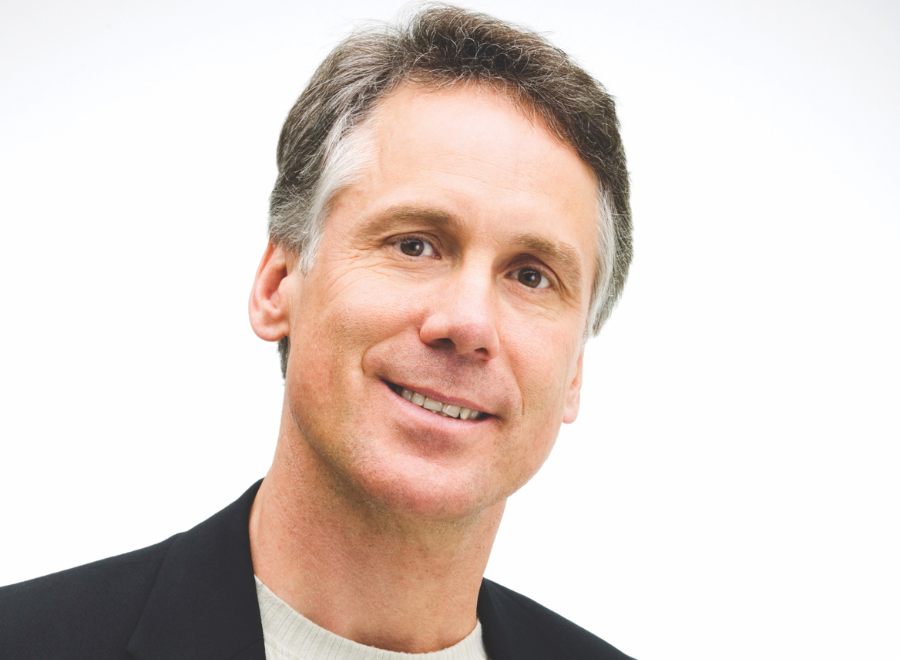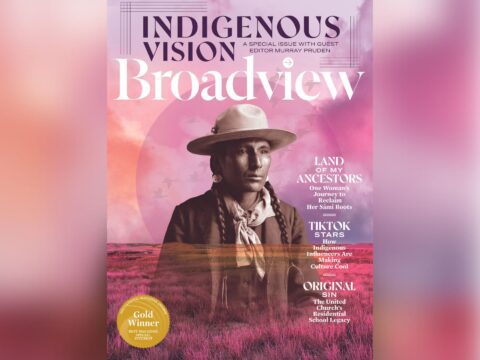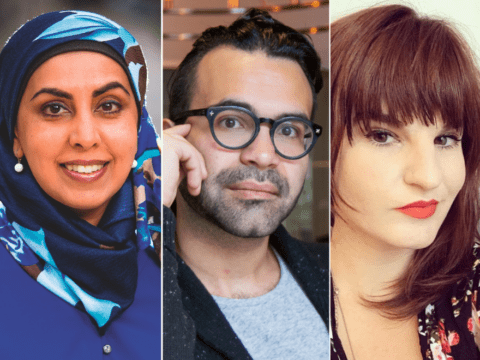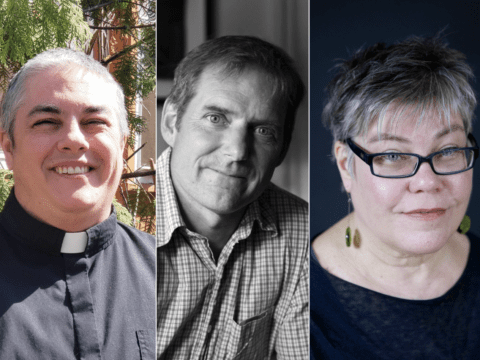American evolutionary apostle Rev. Michael Dowd brings his message of a science-based spirituality to Ontario this month. He spoke to Ambury Stuart from a summer stop in Michigan.
Ambury Stuart: You’ve described yourself and your wife, Connie Barlow, as “two itinerant evolutionary missionaries.” You’ve travelled in your van across North America for the past 11 years speaking to both religious and secular groups. How did you come to be in this unique form of ministry?
You may unsubscribe from any of our newsletters at any time.
Michael Dowd: I was originally ordained in the United Church of Christ here in the United States and pastored three UCC churches over the course of a decade, and then I did environmental sustainability and community organizing work for about six years. I met Connie Barlow, a science writer, in 2000. We both had been immersed in what is now called the “big history” movement, this sacred understanding of evolution and the history of the universe. We got this vision of living our lives on the road. Within a few months of having the vision, we jumped out [and did it]. We’ve spoken to about 1,800 groups — from evangelicals to atheists and everything in between. Everywhere we go, we preach and teach the same message: the inspiring side of science; the sacred, soulful side of science.
AS: Your itinerant ministry reminds me of St. Paul. Paul had a Damascus Road experience where his mind was changed, and in your book Thank God for Evolution, you talk about your own Damascus Road experience. Could you tell me more about that?
MD: Even though I was raised Roman Catholic, as a teenager I was struggling with drugs and alcohol and sexual issues, and the only people who were throwing me a lifeline were the fundamentalists. So the people I hung out with and the books I read were all coming from a very anti-evolution biblically literalist perspective.
I [eventually] accepted evolution, but I didn’t whole-heartedly embrace it until Feb. 1, 1988. I took a class with Albert Lachance, who had studied one on one with [Catholic ecotheologian] Thomas Berry for five years. Within a half hour of his presentation, I got goosebumps up and down my arms and legs. I started to cry, and I realized, “Oh my God. I’m going to spend the rest of my life popularizing this message.”
Because what he was talking about was this whole vision that we are not separate from nature; we’re not separate from the universe. The universe has been expanding and unfolding and becoming more and more complex all the time, and in this solar system, the universe became complex enough that a piece of itself could look back at itself and begin to understand itself. So as humans, we’re not separate from nature, but we are the universe becoming conscious of itself. We are nature uncovering its own nature.
It all made so much sense that I just let go of any otherworldly or unnatural interpretations of my tradition.
AS: Do you still consider yourself a Christian?
MD: I’m just as passionately committed a Christian as I ever was; I just became a Christian naturalist rather than a supernaturalist. I still deeply identify with the Christian tradition, but I began to see mythic language as vital, as necessary, but not to be taken literally. And so now, I’m an evolutionary evangelist. I’m a big history evangelist.
AS: Could you elaborate on this? What is “big history”?
MD: Big history is the academic discipline that is the history of everyone and everything. It’s basically physical evolution, biological evolution and cultural evolution as one modern-day creation story. It’s our first and only evidence-based creation story. And it’s not merely secular, because one of the fundamental insights you realize when you take a big history look at religion is that all religions make sense. Religions have always helped people to understand two fundamental questions: what’s real and what’s important. Or how things are, and which things matter. All religions help people live in right relationship to reality as experienced in [their] part of the world at [their] time in history.
AS: In one of your recent blog posts, you distil your theology down to one sentence: “Reality is our God, evidence is our scripture, integrity is our religion, and contributing toward a healthy future is our mission.” What exactly do you mean by this statement?
MD: [The science fiction writer] Philip K. Dick says, “Reality is that which, when you stop believing in it, doesn’t go away.” And so that is what I’m pointing to when I use the word “God.” I’m speaking of what is fundamentally, undeniably, inescapably real.
People don’t argue whether nature or the universe is real. But nature [as a concept] didn’t exist in biblical times. The universe didn’t exist 3,000 years ago. What we today call the wind or the weather, the ancient Hebrews called spirit, ru’ach. What we call reality or the environment or nature, Moses called the Lord Almighty. Jesus called Abba. Mohammed called Allah. In other words, what we call the universe, ancient peoples called God.
And I think the most important divine revelation of the last hundred years is that God is a personification, not a person. If we don’t get that, we’re going to continue to think of God as a being outside nature. So nature then becomes something we can exploit, because we’re not thinking of it as the revelation or the manifestation or incarnation of God.
AS: And what about the next part, “Evidence is our scripture”?
MD: When I say evidence is my scripture, what I mean is that the primary way that God, or reality personified, is communicating to us today is not through ancient texts but through current evidence — scientific evidence, cross-cultural evidence and historic evidence. Evidence gives us a better sense of what’s real and what’s important than do ancient mythic writings or handed-down wisdom.
I think we’re in the early stages of what historians will one day look back on and say is religion’s evidential reformation. For example, for most of western history, the primary authority — where you went to for your authoritative guidance in terms of what’s real and what’s important — was the Catholic hierarchy. And then, in the 16th century, the Protestant reformers started saying, “No, no, no. Sola scriptura. Only the Bible.” So the Bible became the primary authority.
Well, what we’re now realizing (and the secular world has understood this for a couple of hundred years, but we religious people are just starting to get with the program) is that our best map of what’s real and what’s important comes from all forms of evidence, interpreted collectively.
AS: How does “integrity is my religion” fit in?
MD: Integrity is living in right relationship to reality. It’s living in right relationship to our inner nature, our outer nature, our social nature and our interpretive nature. So all these aspects of living in right relationship to reality, that’s what my religion is, my calling. And that’s related to what I was talking about in terms of mission. My mission is working with people of other backgrounds and belief systems in the service of a vibrant future for planet Earth and all species.
AS: So how do we achieve the mission of a healthy future?
MD: I would say the only thing that’s going to save humanity is, to use mythic language, the Second Coming of Christ. And I don’t mean a six-foot, 180-pound man coming down magically on the clouds. I’m talking about the awareness that God is incarnate in nature, God is incarnate in the universe. In the same way that to look at Jesus was to see the Divine, that’s true of the universe. And when we get that, no longer will we treat nature as an “it” to be exploited for our benefit. We will treat nature as a “thou” to be related to honourably, respectfully.
This interview has been edited and condensed.
***
This story first appeared in The United Church Observer’s September 2013 issue with the title “‘When I use the word ‘God,’ I’m speaking of what is fundamentally, undeniably, inescapably real.’”












